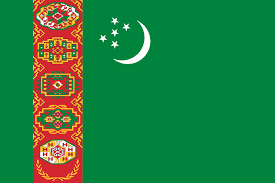Language/Turkmen/Vocabulary/Family-Members
| ◀️ Adjective Agreement — Previous Lesson | Next Lesson — Relationships ▶️ |
Introduction[edit | edit source]
In this lesson, we will explore the Turkmen words for different family members. Family is an integral part of Turkmen culture, and it is important to have a good understanding of the vocabulary related to family and relationships. By learning these words, you will be able to talk about your family members and understand when others talk about their families. This lesson is suitable for complete beginners and will help you lay a strong foundation in the Turkmen language.
Turkmen Vocabulary for Family Members[edit | edit source]
Family is highly valued in Turkmen society, and there are specific words to describe each family member. Let's start by learning the Turkmen words for immediate family members, such as mother, father, sister, and brother.
Mother[edit | edit source]
The Turkmen word for mother is "äne". It is pronounced as "ah-neh".
| Turkmen | Pronunciation | English |
|---|---|---|
| äne | ah-neh | mother |
Example sentences:
- Meniň änem gyzyl saçly. (My mother has red hair.)
- Meniň änem ýaşal. (My mother is young.)
Father[edit | edit source]
The Turkmen word for father is "baba". It is pronounced as "ba-ba".
| Turkmen | Pronunciation | English |
|---|---|---|
| baba | ba-ba | father |
Example sentences:
- Meniň babam işgär. (My father works.)
- Meniň babam aýaly. (My father is tall.)
Sister[edit | edit source]
The Turkmen word for sister is "gül". It is pronounced as "gool".
| Turkmen | Pronunciation | English |
|---|---|---|
| gül | gool | sister |
Example sentences:
- Meniň gülüm okuwçy. (My sister is a student.)
- Meniň gülüm köp kitap okaýar. (My sister reads a lot of books.)
Brother[edit | edit source]
The Turkmen word for brother is "agabat". It is pronounced as "a-ga-bat".
| Turkmen | Pronunciation | English |
|---|---|---|
| agabat | a-ga-bat | brother |
Example sentences:
- Meniň agabatym sport bilen meşgullanýar. (My brother is involved in sports.)
- Meniň agabatym ýigit. (My brother is a boy.)
Grandparents[edit | edit source]
In Turkmen, there are specific words for maternal and paternal grandparents.
- The Turkmen word for grandmother (maternal) is "nene". It is pronounced as "neh-neh".
- The Turkmen word for grandmother (paternal) is "enek". It is pronounced as "eh-nek".
- The Turkmen word for grandfather (maternal) is "dede". It is pronounced as "de-de".
- The Turkmen word for grandfather (paternal) is "baba". It is pronounced as "ba-ba".
Example sentences:
- Meniň nene-delemiň ýüz üýrenoklary bar. (My maternal grandmother has a hundred grandchildren.)
- Meniň dedem köp sanyda kitaplar okar. (My grandfather reads a lot of books.)
Other Family Members[edit | edit source]
Here are some additional Turkmen words for other family members:
- The Turkmen word for daughter is "gyz". It is pronounced as "guzh".
- The Turkmen word for son is "oglan". It is pronounced as "og-lan".
- The Turkmen word for aunt is "hala". It is pronounced as "ha-la".
- The Turkmen word for uncle is "amca". It is pronounced as "am-ja".
- The Turkmen word for cousin is "sekiz". It is pronounced as "se-kiz".
- The Turkmen word for niece is "neĝiz". It is pronounced as "ne-ghiz".
- The Turkmen word for nephew is "neĝe". It is pronounced as "ne-ge".
Example sentences:
- Meniň gyzym okuwçy. (My daughter is a student.)
- Meniň oglanym sport bilen meşgullanýar. (My son is involved in sports.)
- Meniň halam gaplaşýar. (My aunt is talking.)
- Meniň amcam işgär. (My uncle works.)
- Meniň sekizlerim garaşygyň ýerinde ýaşaýarlar. (My cousins live in a beautiful place.)
- Meniň neĝizim ýigit. (My niece is a boy.)
- Meniň neĝem sportçy. (My nephew is an athlete.)
Cultural Insights[edit | edit source]
Turkmen culture places high importance on family and the role of family members. Traditionally, the family structure in Turkmenistan is patriarchal, with the father as the head of the household. However, in modern times, the roles and dynamics within families have evolved to be more egalitarian.
Extended families are common in Turkmen society, with multiple generations living together under the same roof or in close proximity. This allows for strong relationships and support networks within the family unit.
It is also common for Turkmen families to have large numbers of children. This is influenced by cultural and religious factors, as well as the importance placed on maintaining and strengthening family ties.
Practice Exercises[edit | edit source]
Now, let's practice using the Turkmen vocabulary for family members. Complete the following exercises and check your answers below.
Exercise 1: Match the Turkmen words with their English translations.
- Äne
- Baba
- Gül
- Agabat
- Nene
a) Sister b) Mother c) Father d) Brother e) Grandmother
Exercise 2: Fill in the blanks with the appropriate Turkmen words.
- Meniň __________ işgär.
- Meniň __________ ýaşal.
- Meniň __________ köp kitap okaýar.
- Meniň __________ sport bilen meşgullanýar.
- Meniň __________ ýaşly.
Exercise 3: Translate the following sentences from English to Turkmen.
- My sister is tall.
- My father works.
- My brother has blue eyes.
- My grandmother loves cooking.
- My aunt is a teacher.
Exercise Solutions[edit | edit source]
Exercise 1:
- Äne - b) Mother
- Baba - c) Father
- Gül - a) Sister
- Agabat - d) Brother
- Nene - e) Grandmother
Exercise 2:
- Meniň änem işgär.
- Meniň babam ýaşal.
- Meniň gülüm köp kitap okaýar.
- Meniň agabatym sport bilen meşgullanýar.
- Meniň nene-delemiň ýaşly.
Exercise 3:
- Meniň gülüm uzyn.
- Meniň babam işgär.
- Meniň agabatym gök gözli.
- Meniň nene-delemiň aş-çäý etmegiňi seýýär.
- Meniň halam öýji öwrenji.
Congratulations on completing the exercises! You are well on your way to mastering the Turkmen vocabulary for family members.
Sources[edit | edit source]
Other Lessons[edit | edit source]
| ◀️ Adjective Agreement — Previous Lesson | Next Lesson — Relationships ▶️ |

